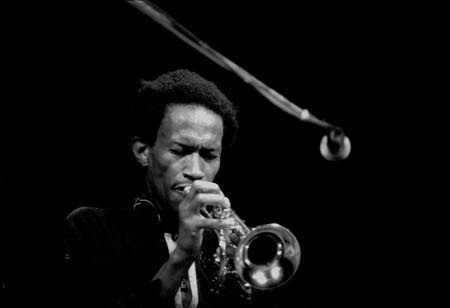RFC
Here’s my two cents regarding the magnificent discussion that came up in this space a few weeks ago. I’ve cobbled together an edited version of the comments, trying to get to the core of the arguments. That chronology follows my new entry. RFC (Request For Comments) was used as the title for most early papers about the internet, and emphasized its collaborative nature. More comments are enthusiastically welcomed.
I was sitting in a café yesterday and a recording of Chet Baker came on. Man, I love the way he played! I always have. And I thought to myself: I play the same instrument, but I don’t sound anything like Chet. I don’t think I could if I tried. Not for lack of practice–it’s just not who I am.
A musician has to work hard to sound like anything at all. Just to get a decent sound out of a horn is, to be honest, several years’ work, even for the most naturally gifted players. I could be wrong, but I’d venture that goes for any instrument–acoustic, electric, or electronic.
If a person is going to work that hard to play music, at some point he or she has to choose what to work on. Decisions are made about that practice material, especially in the most intense years of work, when the so-called rudiments have been dealt with. (I say so-called rudiments because every professional musician I know, save one, still practices the basics every day). It’s a formative time, and a player finds a unique path based on those choices.
But no matter what musicians work on, they are still endowed with their own body and with their own life experience. Whether they aspire to sheer originality or to carbon copying kind of doesn’t matter. At the end of the day, they are going to sound like themselves–part of playing music is facing up to that reality. Not that it’s a limitation; there are always infinitely deeper layers to be discovered. But everything one works on, no matter how rote, no matter how repetitive, no matter how creative and transgressive, is ultimately going to be a reflection of oneself. Musicians simply have to work to get better.
Whether or not a musician chooses to strive for an original voice, they are going to remain who they are as long as they continue to work with dedication, perseverance, and honesty.
The paradox is that if you can only sound like yourself, then there’s no way you can be anything but original.
******
Edited comment thread:
…whatever it is you are working on, the creativity, the drive, the imagination has to all come from somewhere inside yourself. Ultimately, there is no exterior ruler or grading system separate from your work.
Posted by: Dave | March 5, 2009 03:50 PM
—
As an actual theory of artistic expression it seems kind of silly and naive. The creativity, drive, imagination, etc. are all fundamentally social, both in their very composition–they’re made up of all kinds of things acquired from others… Our “selves” are just not all that important or interesting apart from all the external influences, judgments and associations.
Posted by: Oran P. Kelley | March 7, 2009 11:41 PM
—
…To make practice meaningful, I think you have to take all the ideas and forms of the art and find your own way through them. To imagine a new way to work with the materials is the artist’s job. And in that case the artist is the only one who, at the end of the day, can decide if the final result satisfies. …I also believe that to work one has to turn away, transmuting raw materials into a personal reflection of reality.
Posted by: Dave | March 8, 2009 08:38 AM
—
…the only way [musicians] can make a significant artistic statement is through compromise–through engaging with the world and with the audience and creating a workable modus vivendi… Music students should NOT be obsessed with finding their “personal voice…” Music students should be concerned about making music. And what counts as music, what endures, and what someone is willing to support you to do isn’t up to the artist alone.
Posted by: Oran Kelley | March 10, 2009 09:03 AM
—
I find it odd to suggest that artists should ignore their “personal reflections.” …No matter the musical or societal forces that influence an artist, one must ultimately decide the direction and content of new music oneself and find the motivation to realize it… I’m surprised, honestly, at how negatively you speak about artists attempting to innovate. If I were to characterize modern music, I would certainly not identify the chief problem as too many musicians being too different.
Posted by: Steve Peterson | March 10, 2009 04:05 PM
—
…if we established a musical pedagogy that discouraged innovation and personality as sternly as can be imagined in our country, we’d have the same amount of good musical innovation as we have now and a lot less mock innovation, bloviated Coltrane-esque expressionism and make-pretend radicalism that is neither pleasing nor interesting… No the problem isn’t too many musicians who are too different, it’s too many musicians who think that being different is imperative…
Posted by: Oran Kelley | March 10, 2009 06:48 PM
—
…if you are intent upon dissing personal artistic expression, the search for one’s own voice or sound, as a key driving force in jazz I think you must include all of jazz history in your argument and therefore dismiss all of the innovators as misguided. Kind of silly but my point is that we know that the search for a unique expression, something that distinguished one musician from another, was of paramount importance to all the early jazz artists.
Posted by: Mike Grimaldi | March 11, 2009 01:21 PM
—
Tradition has a context, and ought not be mindlessly pursued… I don’t think it benefits either listener or student or the future of the music to continue to make “finding your own voice” such a shibboleth.
Posted by: Oran Kelley | March 12, 2009 12:13 PM
—
… You make it sound as if Lester Young just got lucky or something. As if no thought or intellect was involved. As if it were easy. There is too much evidence to the contrary.
Posted by: Mike Grimaldi | March 12, 2009 09:37 PM
—
… Young didn’t create his sound because that’s what he was taught to do or because that is what his peers valued. He did it because *he* wanted to and could create a sound that was more “Lester Young.””
Posted by: Oran Kelley | March 14, 2009 07:55 PM
—
… as early as 1915 in New Orleans there was a school of “syncopated music.” In other words, jazz education is as old as the music… it is also highly likely that [Lester] had someone helping him in some way or another, probably encouraging him to find his own voice, because that’s what he did… in my opinion, one conclusion we can certainly draw is that, in the 1930s, like today, the act itself, finding one’s own voice, being an “exception,” was hard. Then, like now, you had to have talent, guts, determination, intelligence, dedication and you had to be willing to pay a price…Further I would say that this is the most worthy of goals, the pursuit of which is diminished at our peril…
Posted by: Mike Grimaldi | March 15, 2009 11:42 AM
—


